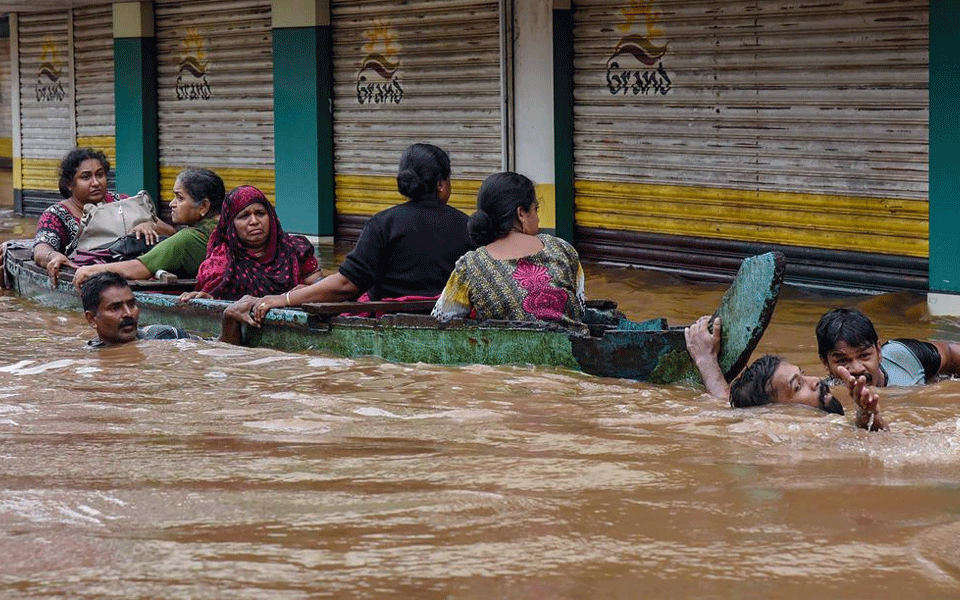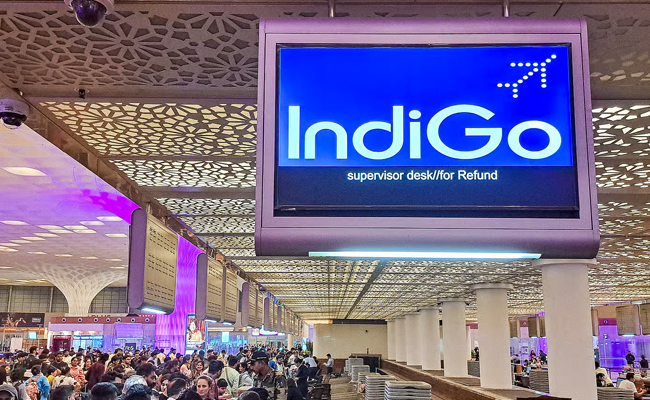New Delhi, Aug 23 : India may not have accepted the UAE government's offer of Rs 700 crore financial aid to flood-devastated Kerala but according to the National Disaster Management Plan of 2016 if the national government of another country offers assistance as a goodwill gesture to disaster victims, the central government may accept it.
"As a matter of policy, the government of India does not issue any appeal for foreign assistance in the wake of a disaster. However, if the national government of another country voluntarily offers assistance as a goodwill gesture in solidarity with the disaster victims, the central government may accept the offer," says the Plan drafted by the National Disaster Management Authority.
According to the 2016 Plan, the Home Ministry is required to coordinate with the External Affairs Ministry, which is primarily responsible for reviewing offers of assistance and channelising the same.
It said that in consultation with the state government concerned, the Home Ministry "will assess the response requirements that the foreign teams can provide".
Kerala Chief Minister Pinarayi Vijayan has cited this Plan to make his point for India to accept the offer from the United Arab Emirates (UAE), home to around 2.8 million expatriate Indians, most of whom hail from Kerala.
Apart from the UAE, Qatar has offered Rs 36 crore and the Maldives $50,000 as financial aid to Kerala.
The worst floods to hit Kerala since 1924 have claimed around 370 lives since monsoon rains began on May 29 and displaced hundreds of thousands this month.
India on Wednesday politely declined financial aid from foreign governments citing an existing policy.
"The government of India deeply appreciates offers from several countries, including from foreign governments, to assist in relief and rehabilitation efforts after the tragic floods in Kerala," External Affairs Ministry spokesperson Raveesh Kumar said in a statement.
"In line with the existing policy, the government is committed to meeting the requirements for relief and rehabilitation through domestic efforts," Kumar said.
"Contributions to the Prime Minister's Relief Fund and the Chief Minister's Relief Fund from NRIs, PIOs and international entities such as foundations would, however, be welcome."
Sources here also told IANS that current stand stemmed from a decision taken by the then UPA-I government after the 2004 tsunami when it decided that India will not be accepting financial aid directly from foreign governments.
The UPA-II government too reiterated New Delhi's position after the 2013 cloudburst in Uttarakhand in which over 5,700 people died.
The sources referred to the government's statement then which said that "as a general policy in case of rescue and relief operations we have followed the practice that we have adequate ability to respond to emergency requirements".
The statement said that for a variety of reasons, India has not in the past too, unless there are specific circumstances, been able to accept offers of assistance for rescue and relief.
"Beyond the rescue and relief phase there are other phases," the Ministry stated.
"These are rehabilitation, reconstruction, and so on. If reconstruction and other measures are provided for those elements, we will examine how they fit into the broader plan in terms of rehabilitation and reconstruction in the region and take a call at that stage rather than say that this was for all times," the Ministry had said after the Uttarakhand cloudburst.
Meanwhile, two former Foreign Secretaries -- Shiv Shankar Menon and Nirupama Rao -- feel there is nothing wrong in accepting foreign governments' aid.
Rao said that offers of flood relief from Gulf countries should be treated with sensitivity. "True that as country we can give rather than take assistance but 80% of Indians in the Gulf are Malayalis," Rao tweeted.
"Offer of flood relief assistance from that region must be treated with sensitivity. Saying no is simple, but for Kerala-in-crisis, it's not so simple."
Menon said the 2004 decision was not to accept foreign participation in relief but take it for long-term rehabilitation.
"If (my) memory serves (me right), the 2004 decision was not to accept foreign participation in relief but accept it for for long term rehabilitation case by case," he tweeted in response to Rao's comments.
"No rescue teams needing hand-holding and interpretation but yes to rebuilding houses, bridges, roads... A way forward for Kerala?" he stated.
Sanjaya Baru, media advisor to former Prime Minister Manmohan Singh, concurred with Menon.
He said in a tweet: "You are correct. We said no to relief but accepted support for rehab. Also one must distinguish between normal aid and help in disaster. Later more humanitarian. Also Gulf Kerala relationship is unique. Lots of goodwill for Malayalis in Gulf."
Let the Truth be known. If you read VB and like VB, please be a VB Supporter and Help us deliver the Truth to one and all.
Bengaluru (PTI): The Karnataka government has issued directions to municipal corporations across the state to regulate and prohibit feeding pigeons in public places, citing serious public health concerns.
Deputy Secretary to Government V Lakshmikanth has written to the Urban Development Department requesting it to issue directions to the Greater Bengaluru Authority (GBA) and all municipal corporations to take immediate steps to implement the measures.
In an official note dated December 16 issued by the Health and Family Welfare Department and released to the media on Wednesday, the department said uncontrolled feeding of pigeons in public places has resulted in large congregations of birds, excessive droppings and serious health concerns, particularly respiratory illnesses linked to prolonged exposure to pigeon droppings and feathers such as hypersensitivity pneumonitis and other lung diseases.
ALSO READ: Chinese GPS tracker found on seagull near Karwar Coast
"The commissioner, the Greater Bengaluru Authority and the Commissioners and chief officers of other municipal corporations shall take necessary action to mitigate the causes of dangerous disease spread by pigeon and enforce specified guidelines in their respective jurisdiction," the note said.
According to the department, these include a prohibition on feeding pigeons or causing pigeons to be fed in areas where it may cause nuisance or pose a health hazard to the public. Pigeon feeding shall be permitted only in designated areas in a controlled manner, subject to certain conditions.
"The designated areas may be selected in consultation with stakeholders. The responsibility for upkeep of the designated areas and compliance to the directions shall be taken up by some charitable organisation or an NGO. The feeding in designated areas shall be permitted only for some limited hours in the day," it said.
The note further stated that authorised officers of local authorities shall issue on-the-spot warnings and may impose fines for violation of the order, or lodge complaints to prosecute offenders under Sections 271 (Negligent act likely to spread infection of disease dangerous to life) and 272 (Malignant act likely to spread infection of disease dangerous to life) of the Bharatiya Nyaya Sanhita.
It also directed local authorities to conduct public awareness campaigns, including the display of signboards, banners and digital messages, explaining the health hazards associated with pigeon droppings and feathers, the content of the regulatory directions and penalties for violations, and alternative humane methods of bird conservation that do not endanger public health.





